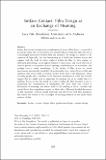Files in this item
Surface contact : film design as an exchange of meaning
Item metadata
| dc.contributor.author | Donaldson, Lucy Fife | |
| dc.date.accessioned | 2018-06-21T14:30:06Z | |
| dc.date.available | 2018-06-21T14:30:06Z | |
| dc.date.issued | 2018-06-19 | |
| dc.identifier | 252804432 | |
| dc.identifier | 2a649e55-3df8-41f3-bd76-b0d6d706f95f | |
| dc.identifier | 000435598600005 | |
| dc.identifier | 85137210093 | |
| dc.identifier.citation | Donaldson , L F 2018 , ' Surface contact : film design as an exchange of meaning ' , Film-Philosophy , vol. 22 , no. 2 , pp. 203-221 . https://doi.org/10.3366/film.2018.0073 | en |
| dc.identifier.issn | 1466-4615 | |
| dc.identifier.other | ORCID: /0000-0002-4029-7465/work/61978887 | |
| dc.identifier.uri | https://hdl.handle.net/10023/14413 | |
| dc.description.abstract | Surface has become an important consideration of sensory film theory, conceived of in various forms: the screen itself as less a barrier than a permeable skin, the site of a meaningful interaction between film and audience; the image as a surface to be experienced haptically, the eye functioning as a hand that brushes across and engages with the field of vision; surfaces within the film, be they organic or fabricated, presenting a tactile appeal. Surface evokes contact and touch, the look or sound it produces (or produced on it) inviting consideration of its materiality, and perhaps even a tactile interchange. If the surface of film, across its varied associations, presents the possibility of an intersubjective contact between film and audience, this article seeks to include another body: that of the filmmaker. There are many people who contribute to the material constitution of a film and I would suggest that we might seek to appreciate its textures just as we might that of a painting. Focus on the fine detail of textures within the film becomes a way to foreground the contributions of filmmakers who have been less central to discussions of meaning, but whose work in the making of décor, costume and sound effects, has a significant impact on filmic affect. Through detailed discussion of film moments, archival design materials and interviews with film designers, this article will attend to the exchanges of meaning situated on the audio-visual surfaces of film. | |
| dc.format.extent | 19 | |
| dc.format.extent | 98710 | |
| dc.language.iso | eng | |
| dc.relation.ispartof | Film-Philosophy | en |
| dc.subject | Surface | en |
| dc.subject | Texture | en |
| dc.subject | Design | en |
| dc.subject | Affect | en |
| dc.subject | Production design | en |
| dc.subject | Costume design | en |
| dc.subject | B Philosophy (General) | en |
| dc.subject | PN1993 Motion Pictures | en |
| dc.subject | T-NDAS | en |
| dc.subject | BDC | en |
| dc.subject | R2C | en |
| dc.subject.lcc | B1 | en |
| dc.subject.lcc | PN1993 | en |
| dc.title | Surface contact : film design as an exchange of meaning | en |
| dc.type | Journal article | en |
| dc.contributor.sponsor | Carnegie Trust | en |
| dc.contributor.institution | University of St Andrews. Film Studies | en |
| dc.contributor.institution | University of St Andrews. Centre for Ancient Environmental Studies | en |
| dc.contributor.institution | University of St Andrews. Centre for Contemporary Art | en |
| dc.identifier.doi | 10.3366/film.2018.0073 | |
| dc.description.status | Peer reviewed | en |
| dc.identifier.grantnumber | N/A | en |
This item appears in the following Collection(s)
Items in the St Andrews Research Repository are protected by copyright, with all rights reserved, unless otherwise indicated.

